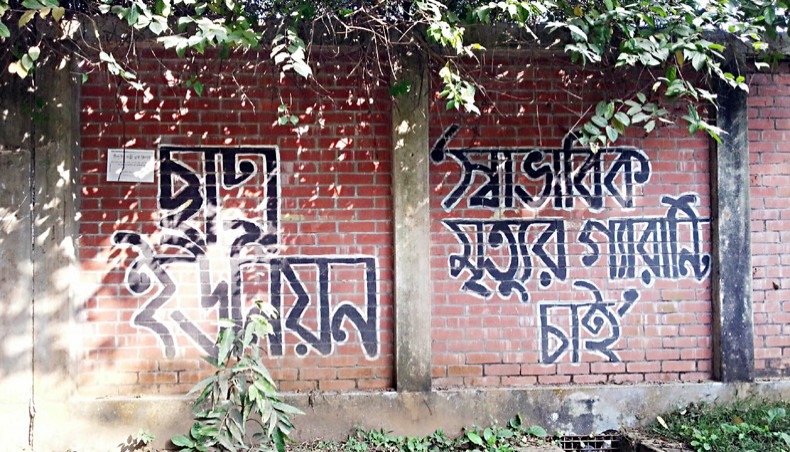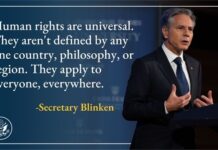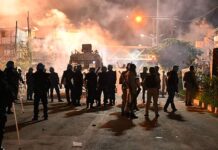
— Collected
Anu Muhammad : HE beautiful morning of November 8 brought terrible shock for me — two lively young men were killed earlier in the night on the road, Arif and Arjun. There were seven more in other ‘accidents’! What a loss, not only personal but also national. They were so promising, loving, and dependable for so many. However, November 8 was not exceptional. Every day we find news of unnatural and untimely deaths, generally called accidents.
When I am writing this piece, the newspaper in front of me shows the number: only in one day (November 25, 2023), 22 people were killed on the road, most of them aged under 40. For the past few years, yearly abnormal deaths by ‘accidents’ have reached nearly 4,000 per year. Thousands of lives could be saved every year if the authorities were held accountable and a few steps were taken, for example, to regularise the fitness of vehicles, license and training of drivers, road quality, and working hours of transport workers. None of these steps are taken, so the rich and powerful can be richer. In what follows, we cannot accept these deaths as accidents; these are structural killings, and the negligent authorities and transport companies are the killers.
In 1974, Nirmal Sen, a politician and writer, wrote that ‘we demand a guarantee for natural death.’ Five decades later, the demand has become more relevant, and our right to natural death is at greater risk. The fact of the matter is that when we cannot live a normal life, how can we expect a natural death?
Living or dying with Dengu
THE same day, on November 25, Dengu caused 12 deaths. In 2022, the highest number of deaths from Dengu was 281. This year, the viral disease already claimed 247 lives in November, and the month is not over yet. And this year, until November 27, the number of deaths reached 1,595, nearly six times as many as in the previous year. Still, the government seems satisfied with their performance. In fact, no effective, very simple, measures to contain Dengu were taken by city corporations, the local government, the health ministry, or the Directorate General of Health Services. Rather, responsibility was shifted to the affected people. Very early this year, many experts had warned about the possible gravity of the dengue outbreak this year. Experts also suggested possible ways to prevent the disease and contain the outbreak. Total inaction, corruption, and the irresponsibility of authorities led to the situation getting worse.
Kichu Hoi Nai (nothing is wrong)
I BELIEVE that the government itself is infected by the kichu hoi nai (nothing is wrong) disease. We are suffering from the soaring price of everyday essentials, but we hear ‘prices are controlled because of the government’s initiative’. We suffer from load shedding every day, and in rural districts, power outages continue for ours, but we hear them saying, ‘This government is highly successful in the power sector’. We see that corruption has now surpassed all previous records, but we hear ‘we do not tolerate corruption’, ‘zero tolerance’. We see dying rivers and the grabbing of forest land, but they say, ‘We are protecting rivers and forests’.
We know that inflation in many countries is under control, and the prices of essentials are coming down in most of the countries. However, not in Bangladesh. The lives of the public at large have become intolerable because of market anarchy. Recently, the Bangladesh Bureau of Statistics acknowledged that food inflation has risen to a 12-year high. Despite the financial crisis, the government seems very liberal in allocating funds to keep its officials happy. For example, in the last five financial years (from 2019–20 to 2023–24), the government spent almost Tk 480 billion on purchasing cars and supporting services (Jugantor, November 26, 2023).
The government’s muscles to suppress workers
IN THE last few months, we have witnessed garment workers mobilising for a living wage. Not once has there been a decision about wages without protests, fights, blockades, strikes, and attacks on the workers. This year was no different. The government mobilised its armed forces to suppress hungry workers; already, four workers, including a woman, were killed and many more injured. We also see fabricated police cases against thousands of workers to harass them; some are already detained and tortured with false cases.
Despite the rapid growth of the garments sector, the wages of the workers in Bangladesh are the lowest in the world. In Vietnam, our closest competitor, the minimum wage is a little less than USD 200; in Cambodia, an economy much weaker than ours, the minimum wage is USD 200 dollars; in India and Pakistan, it is around USD 170-180; and China, the top exporter, has wages around 300 dollars. In Bangladesh, the last wage adjustment in 2018 was USD 95. After months of rallies and protest meetings, the owners this year initially proposed USD 94, less than they got in 2018. After protests and criticism, they proposed BDT 12,500, a little more than USD 110. This is totally unacceptable considering the price hike and the poverty line of income. The demand of the workers was BDT 25, 000 BDT, a little more than 200 dollars.
The duty and obligations of the wage board and the government are not only to serve the owner’s interests but also to listen to the workers and mediate between them. As soon as the owners proposed a shamefully unacceptable wage, the wage board accepted that as final. In addition, the government has expanded its muscle power to back owners and suppress workers movements for a living wage.
Elections without public rights
THE current government was elected in the 2008 election, which was held under an army-backed caretaker government. The way elections were held later in 2014 and 2018 proved once again that elections under the ruling government could only be farcical ones. It is time for the 12th general election, and the government seems to be adamant about taking the same path.
Since October 28, we have been passing days and nights with fear and uncertainty. It appears that the government has taken all measures to crush the Bangladesh Nationalist Party, the main opposition party, and replace it with some subservient groups. Nationwide arrests with false cases, a quick verdict to convict a probable electoral candidate of the BNP, and attacks on the houses of BNP leaders by masked criminals with the police as silent spectators are commonplace. These actions have practically closed the path of peaceful assembly, protest, rallies, discussion, and negotiation. Therefore, we have entered again into the political phase of hartals and blockades. In addition to the police and Rapid Action Battalion, the government has deployed a total of 230 platoons of Border Guard Bangladesh across the country to suppress public discontent, including workers who were demanding a minimum fair wage.
When the government tries to stay in power without a fair election, they work to capture all institutions. For example, the Election Commission, the National Human Rights Commission, and the Anti-Corruption Commission are politicised and made partisan. They lost their ability to work independently. The universities are crippled by appointing party cadres in academic positions and allowing student branches to do whatever they wish to make money and control students. After suppressing people’s rights to vote, the government is trying to make its support base elsewhere by giving special favours to certain groups, like the police, the civil-military bureaucracy, big businesses, and powerful foreign countries.
We note that some powerful countries, namely India, China, Russia, and the United States, explicitly got involved in influencing the country’s destiny. Interestingly, both India and China have taken the same position: to support the ruling government’s project of staying in power by any means. The USA and EU are repeatedly asking for a free and fair election. In fact, this government has given big businesses to all of them and is ready to give more. It is unbelievable that the USA is in any way concerned about democracy and human rights anywhere in the world. Its track records in many countries speak the opposite. Nevertheless, its insistence on democracy for Bangladesh appeared as a tool to assert its other agenda and ensure its broader political space, especially to subdue China’s influence here. It seems that the government is willing to accept anything other than a free, fair election. Recently, the government approved the new and more lucrative Production Sharing Contract model for the US oil company Exxon-Mobile to lease out 15 offshore blocks all together, resulting in a three-fold higher price of gas that we need to purchase and an increased share of profit for the company with export provision. In addition, a long-term deal was signed with another US company to import LNG.
The government’s attempt to go through with a one-sided election exposes not its strength but its fear of facing a public verdict. This authoritarian rule, by suppressing the will of the people, has long-term ominous consequences for the nation’s economy, politics, and, moreover, public rights, therefore the future of the country.
Anu Muhammad is a professor of economics at Jahangirnagar University and editor of quarterly magazine, Sarbojonkotha.
New Age









